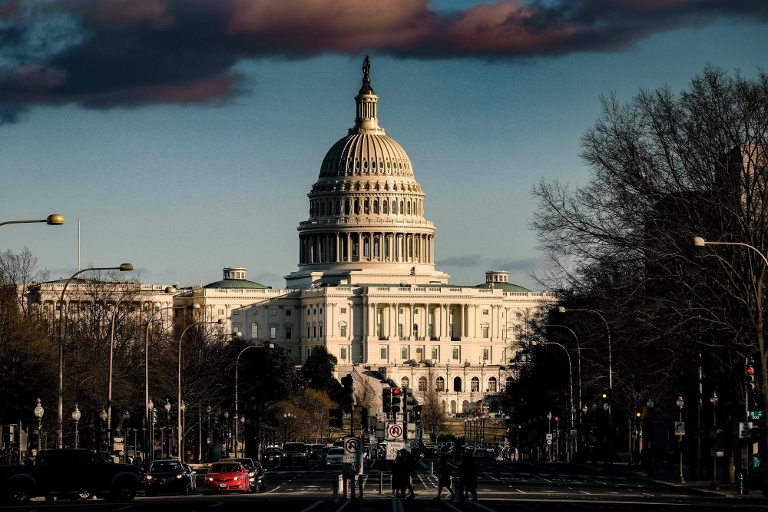Volume 1 , June 3, 2019, Issue 5
Tariff tirades. The House and Senate are back from their week of district workdays. They’ve come back to a growing list of to-do’s in an atmosphere of contention within and between both parties and between Congress and the White House.
Trump’s decision to slap a monthly five-percent tariff (up to 25 percent) on all Mexican imports beginning June 10th is consolidating Democratic opposition to the president while fracturing Republican ranks.
Mexico is the US’s third largest trading partner accounting for 14.5 percent of overall trade, i.e., exports and imports. Trump’s tariffs are expected to hit the auto and agricultural industries particularly hard. The other top three US trading partners are China, Canada, and Japan. In recent weeks Trump has either placed or threatened tariffs on all of them.
Despite what the president claims, US consumers, not the nations targeted, pay the price of his tariff tirades.
Trump’s Mexico announcement caught congressional Republicans off guard and has driven a wedge within their ranks. Lindsey Graham of South Carolina, who has become one of Trump’s most enthusiastic fan boys, applauded the move. Senate Majority Leader Mitch McConnell is noncommittal saying only the proposal “deserves serious examination.”
According to Bloomberg Senate Finance Chairman Chuck Grassley (R-IA) of Iowa, whose powerful panel holds the keys to trade, tax, health, and entitlement legislation, opposes the promised Mexico levy. Other Republicans joining Grassley in opposition to the tariff are Pat Toomey (R-PA), Martha McSally (R-AZ), John Cornyn of Texas, Joni Ernst (R-IA) and Rob Portman (R-OH). Their votes will be needed to pass the USMCA—the newly negotiated treaty intended to replace NAFTA and which Trump considers essential to his legacy and re-election. The House Ways and Means Committee’s top Republican, Kevin Brady, whose state of Texas, along with other border states like Arizona will be hardest hit, has called for resolution of the Mexico “problem” before June 10th when the first tariffs will be levied. Trump has promised to raise the tariff by five percent each month up to a total of 25 percent unless Mexico finds a way to stop migrants from Central America coming into the US.
Some Democrats are using this latest Trumpian tirade, along with Special Counsel Mueller’s refusal to state unequivocally that Trump had not obstructed justice, to fuel their efforts to begin formal impeachment proceedings. How it will all play out is anyone’s guess at this point.
What is not a matter of guesswork is that the chaos and contention on Capitol Hill will make it harder for Congress and the White House to get done what needs to be done—especially in terms of avoiding deep budget cuts and keeping the government open for business as the fiscal year draws to a close in September.
To do or not to do. Topping the Congressional to-do list is passing the disaster aid bill that has been languishing in Congress for months. Initially, the bill was held up because the White House threatened to veto any bill that provided additional funds for Puerto Rico.
The House and Senate finally reached agreement on legislation that would provide $19.1 billion in aid to states and Puerto Rico covering losses due to hurricanes, wildfires, and rainstorms leading to widespread flooding.
The Senate voted its approval before Congress went out on its workday vacation. The House had hoped to pass it by unanimous consent while most representatives were in their home districts. A procedure that did not require most representatives to have been physically in the chamber–if there was no objection. Several ultra-conservative Republican House members shuttled back to DC each time the unanimous motion was to be approved—demanding a recorded vote because of the bill’s impact on an already bloated federal deficit.
Three strikes and the US is out—of luck. Between June and somewhere around the middle of October Congress and the White House face a triple threat of fiscal deadlines—funding the government for FY 2020, raising the debt ceiling and avoiding the automatic spending cuts known as the sequester.
The debt limit had been reached in March. To avoid the consequences the Treasury is using a series of extraordinary measures to extend the government’s borrowing authority. It was originally thought the government could make it through to September or mid-October before bumping again into the ceiling. However, Treasury Secretary Mnuchin announced last week that Congress might have only until late summer to act. What changed from prior estimates was unclear.
Making the grade on climate. Greenpeace released its rankings on the climate records of the candidates running for president in 2020. The rankings were based on answers to a survey taking into consideration factors such as statements, legislative records, published plans, and responses to a survey. The report card looked at the 19 candidates who have so far qualified for the first Democratic primary debate in June.
Washington Gov. Jay Inslee (D) took the top position with an A-minus. Senators Booker (D-NJ) and Sanders (I-Vt.) both earned grades of B-plus, putting them just behind Inslee to round out the top three spots.
Sen. Kirsten Gillibrand (D-N.Y.), who came in fourth place, said in her survey response that she would champion transitioning the U.S. to 100 percent clean energy in 10 years by 2030. Her 10-year plan would include decarbonizing buildings, the industrial sector, and the transportation industry. It’s the first timeline commitment from Gillibrand, who has not released a comprehensive climate plan.
O’Rourke and Buttigieg were graded as Cs, while Harris and Kloburchar received C- scores. Vice President Biden tied for last place with former Colorado Gov. John Hickenlooper (D) and Representative Tim Ryan (D-OH) with a grade of D-minus.
Trump received a failing grade, as did his possible opponent for the Republican nomination Bill Weld (R), although it is unclear whether the grade was based on survey responses or their records while in office. Weld is the former governor of Massachusetts and ran for Vice President with Gary Johnson on the Libertarian ticket.
The two answers that mattered most to Greenpeace were saying no to fossil fuels and championing a Green New Deal.
Win and not won. The Environmental Protection Agency on Friday made year-round sales of 15 percent ethanol legal while leaving out provisions that the president promised would be included to address price concerns raised by oil refiners.
The EPA action to allow E15 sales in the summer months was met with praise by farming groups and the ethanol industry, while lobbyists for refiners were less than thrilled.
“The President promised that the move to allow greater summertime ethanol use would be coupled with serious market reforms for the [ethanol credit] compliance program,” said the Fueling American Jobs Coalition, which represents refineries.
The coalition said the E15 rule, without enacting reforms to the ethanol credit market, clearly violates the spirit of President Trump’s deal and could harm the livelihoods of refinery workers, who will bear the brunt of higher credit prices.
The EPA cut out the more aggressive aspects of its original proposal to track the ethanol credit market, which was part of the original E15 proposed rule. Inclusion of the measures was part of a “win-win” deal worked out by the Trump administration between the refiners and the ethanol industry, meant to ensure that prices for the ethanol credits are kept in check.
The American Petroleum Institute has argued for months that allowing year-round blending of 15 percent ethanol oversteps the limits put in place by the Clean Air Act and is essentially illegal. The Institute’s warning is simply a veiled threat that they and others opposed to the decision will be challenging it in court.
Very ready for prime time. The cost of renewable energy technologies reached a record low last year across the world.
The International Renewable Energy Agency reports that the global weighted average cost of solar power decreased by 26 percent in 2018, while onshore wind prices fell by 13%. The cost of hydropower dropped 12 percent, and offshore wind fell one percent.
More than three-quarters of the onshore wind and four-fifths of the solar PV capacity that is coming online next year will produce power at lower prices than the cheapest new coal, oil, or natural gas options.
You shouldn’t have done that. The White House budget office criticized House Democrats over provisions in their spending bills that would block the Interior Department from pursuing lease sales in offshore waters and the Arctic National Wildlife Refuge, an ecologically sensitive region in Alaska.
Russell Vought, acting director of the Office of Management and Budget, criticized House appropriators for including provisions in the Interior-Environment bill text that would block Interior from engaging in “pre-leasing and other activities” in the Outer Continental Shelf and conducting “a lease sale” in ANWR.
Separately, Vought wrote that the administration is “disappointed” the Energy-Water bill didn’t zero out funding for the Advanced Research Projects Agency-Energy (ARPA-E), a technology incubator at the Energy Department.
Trump has proposed deep-sixing ARPA-E in every one of his budget proposals since taking office. The program is the civilian version of the Defense Advanced Research Project Agency (DARPA). The Agency works with both university and industry research programs on developing entirely new ways to generate, store, and use energy. ARPA-E is a program that climate deniers and defenders can actually agree on. When Republican members of Congress speak of innovating the nation’s way out of the climate crisis, they are speaking of programs like ARPA-E.
Too quick to know? EPA plans to quickly revamp its guidelines for evaluating whether environmental contaminants can cause cancer or other ailments. Administration critics fear the move is part of a broader effort to weaken the scientific basis for regulating a wide range of pollutants.
EPA sources say the Trump administration is now seeking to revise standards on hurried risk assessments—putting millions of Americans at greater risk. It’s a theme played throughout the administration and helps to explain why EPA, the Departments of Interior and Agriculture, and other agencies and departments have been purging advisory committees and boards of many of their most competent scientists.
Pruitt, before he stepped down as EPA administrator under a cloud of ethics violations, imposed sweeping changes to who can advise the agency on its research and regulatory priorities, opening the door to more industry participation. The move not only made it possible to increase industry membership but opened the door to climate denying scientists whose views were in conflict with mainstream, peer reviewed climate studies of the type relied on by the UN’s Intergovernmental Panel on Climate Change (IPCC) and the administration’s own National Climate Assessment scientists.
The replacement pattern is intended to create an alternative body of evidence that denies established science, which can then be used to justify the rollback of environmental regulations dating back to the Nixon era. The alternative interpretations are also finding their way into the defense briefs in the scores of legal challenges being brought against the administration.
On the rise. Carbon dioxide emissions from burning fossil fuels rose 2.7% last year, according to a new analysis that underscores just how difficult it could be to meet U.S. targets under the Paris climate agreement.
The CO2 increase — the second-largest annual spike since 2000 — comes from the Rhodium Group’s final emissions estimates for 2018.
The emissions bump is slightly smaller than the 3.4 percent rise reported in a preliminary analysis that the independent research firm released in January. The gap in the data was largely due to a drop in coal-fired generation in December of last year.
It’s final. EPA has released the final version of a technical guide for regulators seeking to help individual power plants, refineries, and other sources skirt new pollution control requirements stemming from the agency’s limits on fine particulate concentrations.
The final document, titled “PM2.5 Precursor Demonstration Guidance” and dated yesterday, comes 2 ½ years after EPA released the draft version.
We remember Paris. Sen. Jeanne Shaheen (D-N.H.) plans to introduce a companion bill to the recently House-passed Climate Action Now Act (H.R. 9) that passed the House largely along party lines.
It’s unlikely that the bill will receive a Senate committee hearing or that Majority Leader McConnell will permit a full Senate vote on the legislation. Still, Shaheen’s effort, as was true of Representative Castor’s effort in sponsoring House version of the bill, sends a strong message of the Democrats’ intention to keep climate on the public stage through the 2020 elections.
The Trump of Brasil. Taking a page out of the Trump playbook Brazilian President Jair Bolsonaro is slashing the size of a council that oversees environmental policy, effectively reducing the role of nongovernmental organizations and increasing that of political appointees.
Activists and scientists said they feared Bolsonaro’s action could lead to more deforestation and less environmental oversight in the nation that holds about 60 percent of the Amazon rainforest.
The decree cuts the size of the National Council of the Environment from 100 to 21 members. It also eliminates 105 “alternate” members who traditionally have taken part in debates. Many of whom are environmental activists or independent experts, and critics say the change will stifle their voices.
The highly influential council debates and recommends policies to the federal officials, and the Environment Ministry said the change was meant to make it more agile. Critics disputed the claim.
Lead image: https://unsplash.com/@elevenphotographs























